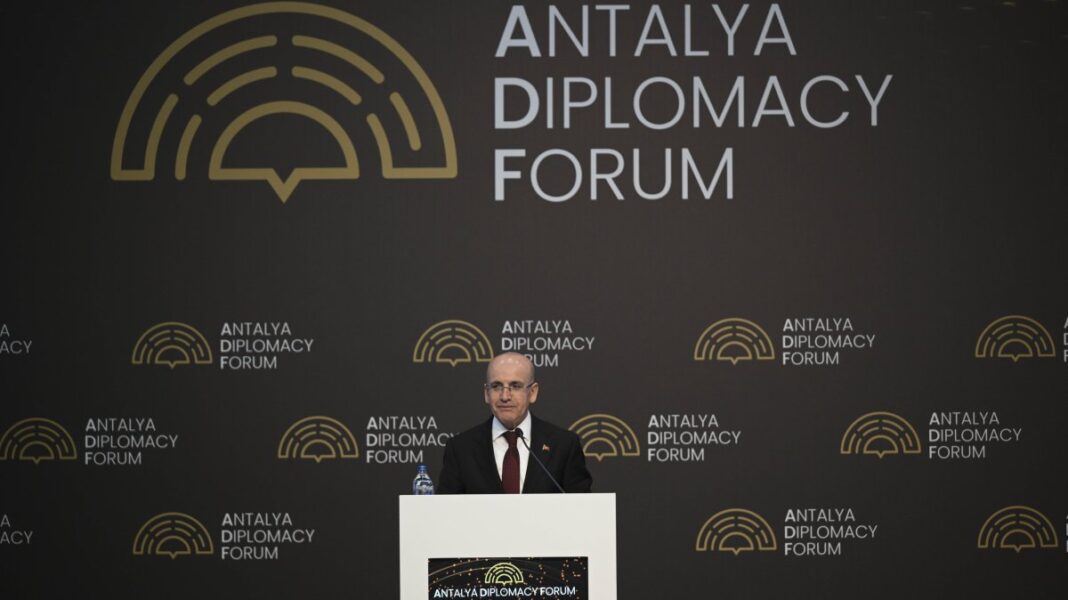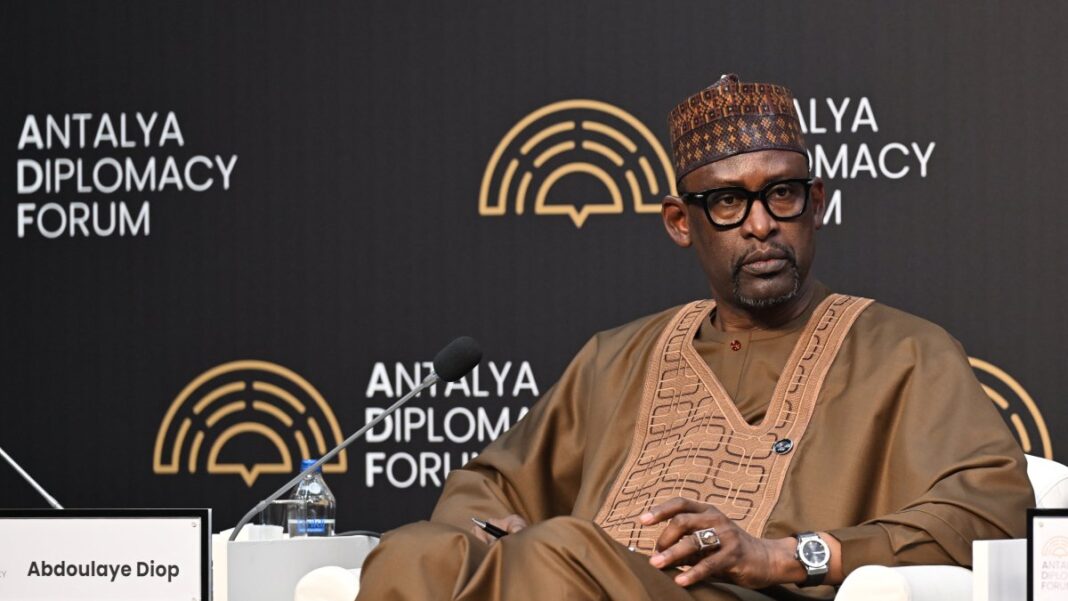There are “no winners” in trade wars, a top official warned on Saturday, suggesting that Türkiye is “relatively more resilient” to trade protectionism.
“There are no winners of trade wars, everybody would be a loser, that’s why we prefer open and free trade,” Treasury and Finance Minister Mehmet Şemşek said in an answer to a question at Antalya Diplomacy Forum (ADF).
“The reality is we will see how things pan out,” he added, also suggesting they were working on “all scenarios,” and pledging to act accordingly.
Delivering a speech at the 4th Antalya Diplomacy Forum during a session titled “Global Challenges and Türkiye’s Outlook,” Şimşek evaluated recent trends in global and domestic economic outlook, starting from tariff measures.
The minister explained that, when looking at exports of goods and services as a percentage of gross domestic product (GDP), Türkiye’s dependance of exports in terms of maintaining growth prosperity is “relatively lower” compared to many countries.
“It means exports are not the main driver of the Turkish economy,” he said, adding that historically net exports “have been rather a drag than being a driver of growth.”
Moreover, Şimşek said “we’re better positioned to navigate protectionism,” citing focus on the immediate neighborhood and strong geographic, cultural and historic links as well as rule-based trade frameworks.
He also mentioned that 62% of exports is rule-based, mentioning it includes the European Union which still advocates for multilateralism, thus making the risks lower in this sense for a foreseeable future.
At the same time, Şimşek touched upon regional integration and connectivity, highlighting that Türkiye is part of the Middle Corridor while also helping build a new corridor called the Development Road.
“We continue to invest in connectivity, peace, security and prosperity of the region because Türkiye will benefit,” he said.
The Middle Corridor links China and Europe through Türkiye by utilizing rail and road networks, while the Development Road project is relatively newer, joint initiative with Iraq, that aims to connect the Persian Gulf to Türkiye’s ports via a new trade and transit route.
Elaborating further, Şimşek said Türkiye’s debt-to-GDP ratio is “pretty low” by emerging markets standards. He cited that in the current climate, investors appear to be in an indiscriminate mode as the selling “is the norm,” but said that “a few months down the road, the fundamentals will be key.”
“That’s why Türkiye is better positioned to deliver growth once we are through this episode,” he added, in reference to recent volatility in global markets and higher risks.
As part of his remarks, he also mentioned Türkiye’s role as manufacturing base in the region while also emphasizing its deterrant power as the second-largest army in NATO and its strong standing in the defense industry, which reached the point of 80% self-sufficiency.
Turkish officials have earlier suggested Türkiye appears to be better positioned to benefit, considering levies imposed by the U.S., by facing only a 10% baseline tariff.
At the same time, Trade Minister Ömer Bolat recently announced the establishment of a new working group to tackle issues arising from Washington’s tariffs.
Rising uncertainty, negotiations
Vice President Cevdet Yılmaz meanwhile, in remarks published by Anadolu Agency (AA) on Sunday cautioned against arising uncertainty, while underlining significance of negotiations.
“A world with uncertainties is actually harmful for everyone. The worst situation in terms of the world economy and world trade is uncertainty. It is very valuable for the world economy for these uncertainties to be eliminated as soon as possible and for negotiations to be conducted effectively and concluded,” Yılmaz told AA.
He also recalled the target of $100 billion in trade volume with the U.S., that has been set by President Recep Tayyip Erdoğan during the first term of U.S. President Donald Trump, suggesting there is balanced structure in trade.
“When we look at last year, we have reached approximately one-third of this and we have a balanced structure in trade, but we still have a long way to go,” he noted.
“Therefore, our agenda is not only tariffs with the United States, but how can we increase and increase the trade volume in a balanced way, of course, in a way that both parties will benefit. Here, in addition to trade in goods, trade in services is also very important,” he added.
“We know that Türkiye is among the countries that are less affected in the first stage regarding the tariff announcements of the U.S.,” Yılmaz furthered.
He also expressed need to follow developments, mentioning China could try to compensate for their exports in other markets, which he said would increase the competition in these markets in the world.
“Therefore, we are closely following the process with all these dimensions.”
“We will evaluate these issues with all our relevant colleagues, especially our Minister of Trade,” he added.
Emphasizing the need to closely follow the developments, Yılmaz suggested they also continue the work on the perspective on “how we can reduce the risks and uncertainties that Türkiye faces in this new environment and how we can evaluate the opportunities.”
Inflation decline
One of opportunities, that has been mentioned by finance minister includes relatively lower oil prices, which directly translate into lower trade deficit and current account deficit, since Türkiye highly relies on imports for its energy needs.
Şimşek noted earlier this week that if oil prices remain below $65 a barrel, Türkiye could experience lower year-end inflation.
In his speech in Antalya, he reiterated that inflation continues falling, underscoring the government’s commitment to the economic program.
“Inflation is falling. We have done everything to push inflation down,” he said.
“We are committed to this program. There’s a strong political commitment, we have invested a lot of political capital in this program,” Şimşek said.
“We have what it takes to bring inflation down,” he added.
Commenting on how the latest market turbulence is affecting the inflation program, the minister said that expectations may deteriorate in the short run, but said that “expectations will ultimately look at realizations.”
“We believe this disinflation will continue,” he explained, citing that while “limited lira weakness is likely to push inflation a bit,” but that domestic demand “is not very strong.”
“There is a compensating factor, and that is oil prices,” he said, reiterating “that is very likely declining oil prices will compensate the deterioration in inflation expectations and limited lira weakness and pass through from that.”
Şimşek noted that, on the fiscal side, the deficit has been elevated for the past couple of years due to significant earthquake-related spending, but this year, they are aiming for a lower deficit, pledging that spending discipline will be maintained.
“We are interested in fiscal consolidation, in lower fiscal deficit … because we want it to help the central bank bring inflation down,” Şimşek said.
Türkiye’s annual inflation slowed down to 38.1% in March, below market forecasts.





